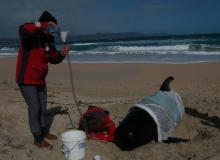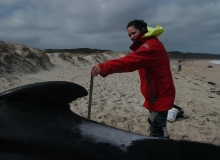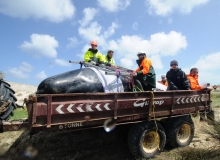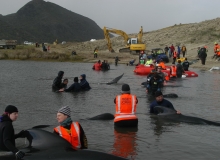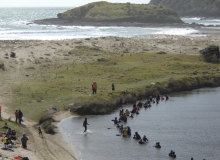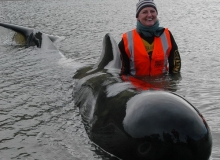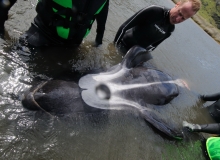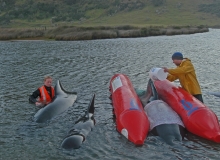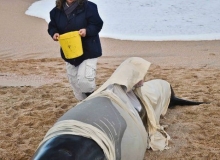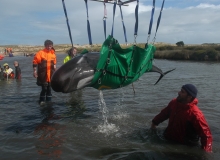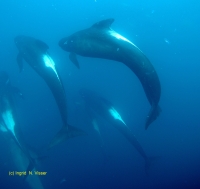With Whale Rescue Team members flying in by helicopter we were able to assess the situation by air and it was clear that many of the pilot whales were beyond saving. Rolling around in the powerful surf many had already succumbed to the conditions. However, with only limited number of volunteers on hand every effort was made to rescue as many as we could. Working closely with the Far North Whale Rescue group as well as local Iwi and Department of Conservation the initial volunteers moved the whales out of the surf and up the steep and soft-sand beach. Once more volunteers arrived we were able to move the whale higher onto the beach and into a more secure area. However, it was clear that the surf conditions precluded any immediate release at this location. The weather forecast was for continued surf and increasing winds.
With a fresh water lagoon nearby it was decided to move the whales into the safety which would also allow the whales to be supported by water and help prevent them from being overheated. Held overnight, the whales remained calm and did not attempt to swim away once a ‘whale marina’ had been scooped out of the side of the shallow lagoon.
The following morning the whales were once again lifted out of the water and this time placed on trucks. Given the extreme shortage of mats and only one lifting frame this process took many hours and the hot sun and strong winds played havoc with the sensitive skin of the pilot whales. Travelling with a police escort the trucks filled with whales headed down narrow dirt roads until reaching the main road and heading towards the release site.
Upon release the whales and volunteers alike were exhausted. Unfortunately two whales died within meters of the sea, but the others were successfully lowered into the cooling and refreshing waters. However, the ordeal was far from over, with a few whales released before they had fully regained their balance and this resulted in at least five attempting to restrand. Eventually four were successfully taken out to sea but one had to be shot on the beach. Overall, given the extreme conditions it was only through the determination of everyone involved that it was possible to save so many.
Rescue Images
Quick Facts
| Name | Pilot whale, long-finned |
| Image |
|
| Suborder | Odontoceti |
| Family | Delphinidae |
| Max. size - Male | 6.7 m (21.9 ft) |
| Max. size - Female | 5.7 m (18.7 ft) |
| Calf size | 1.7-1.8 m (5.5-5.9 ft) |
| Max. weight - Male | 2,300 kg |
| Max. weight - Female | 1,300 kg |
| Calf weight | 75 kg |
| Food | primary food is squid, but known to take fish |
| Latin name | Globicephala melas |
| Location |
Spirits Bay, Far North |
| Latitude |
-34.45274 |
| Longitude |
172.81142 |
At this rescue
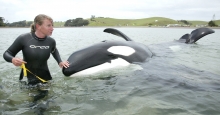
Ingrid has attended numerous mass and individual strandings. She is experienced in sampling and data collection at these events, and in the use of refloatation Rescue Pontoons and other rescue equipment. She has served on the Board and was a trainer for another stranding rescue group.
Read more ››
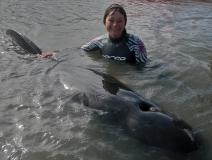
Floppy has attended multiple mass and individual strandings. She is experienced in the use of refloatation Rescue Pontoons and other rescue equipment. Floppy has served on the Board of another stranding rescue group where she was also a trainer and area coordinator.
Read more ››
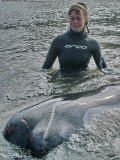
Wendy has attended multiple mass and individual strandings and is trained in stranding rescue techniques, including the use of refloatation Rescue Pontoons and other whale rescue equipment.
Read more ››
With special thanks to
To Department of Conservation staff who worked diligently in trying conditions and yet were willing to try a variety of methods to save these whales, we extend a heart-felt thanks.
To Grant Harnish of Salt Air who dropped everything to ready a helicopter to transport the Whale Rescue team directly to Spirits Bay we can’t say thanks enough for your support.

